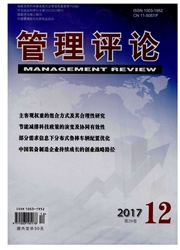

 中文摘要:
中文摘要:
从消费者行为视角研究储蓄和消费问题起步较晚,但自2008年金融危机以来,北美消费者的低储蓄和负储蓄带来的负面影响日益凸显,北美的消费行为学者开始关注如何促进消费者成功储蓄。而我国的情况比较复杂,总体来说我国居民过高的储蓄率一定程度上限制了经济的发展.但也有一些“月光族”确实存在过度消费的问题,从消费者视角研究影响储蓄和消费决策的微观心理因素有利于为我国刺激消费和引导合理消费提供建设性建议。本文认为自我建构是导致我国比欧美国家存得多消费得少的一个重要原因,这主要是因为相依自我在应对目标冲突时比独立自我更有优势.本文通过一个行为决策实验和一个关于实际消费、储蓄现状的研究。在情境自我建构和长期自我建构两个层面证实了这一假设。
 英文摘要:
英文摘要:
Researches on spending and saving among marketing scholars start recently. However, the negative influence of low saving rate in western countries during 2008 financial crisis causes marketing scholars to study how to help consumers to succeed in their saving intention. The situation in China is more complicated. In general, the economic growth of China has long been hindered by its residents' high saving rate. However, there are also some Moonlight Clan in China who save nothing. Understanding the psychological factors that influence consumers' saving and spending decisions have important practical implication on how to stimulate and guide reasonable consumption. We propose that self-construal is an important factor that makes the residents in our country save more but spend less than those in the western countries and this is mainly due to that interdependent is more tolerant of goal conflict than independent. With one behavioral decision experiment and one study on actual saving and spending behavior, we provide convergent evidence for our proposition with both chronic self-construal and situational self-constrnal.
 同期刊论文项目
同期刊论文项目
 同项目期刊论文
同项目期刊论文
 期刊信息
期刊信息
